2015 AFC Asian Cup knockout stage
The knockout stage of the 2015 AFC Asian Cup was the second and final stage of the 2015 AFC Asian Cup, following the group stage. It was played on 22 to 31 January, began with the quarter-finals and ended with the final match of the tournament, held at Stadium Australia, Sydney. The top two teams from each group (eight in total) advanced to the knockout stage to compete in a single-elimination tournament. A third-place match was played between the two losing teams of the semi-finals (United Arab Emirates and Iraq).[1] Australia won the trophy after defeating South Korea in the final.
In all matches in the knockout stage, if the score were level at the end of 90 minutes, two 15-minute periods of extra time was played. If the score were still level after extra time, the match was decided by a penalty shoot-out.[2]
Qualified teams
The top two placed teams from each of the four groups advanced to the knockout stage.
| Group | Winners | Runners-up |
|---|---|---|
| A | ||
| B | ||
| C | ||
| D |
Bracket
| Quarter-finals | Semi-finals | Final | ||||||||
| 22 January – Melbourne | ||||||||||
| 2 | ||||||||||
| 26 January – Sydney | ||||||||||
| 0 | ||||||||||
| 2 | ||||||||||
| 23 January – Canberra | ||||||||||
| 0 | ||||||||||
| 3 (6) | ||||||||||
| 31 January – Sydney | ||||||||||
| 3 (7) | ||||||||||
| 1 | ||||||||||
| 22 January – Brisbane | ||||||||||
| 2 | ||||||||||
| 0 | ||||||||||
| 27 January – Newcastle | ||||||||||
| 2 | ||||||||||
| 2 | ||||||||||
| 23 January – Sydney | ||||||||||
| 0 | Third place | |||||||||
| 1 (4) | ||||||||||
| 30 January – Newcastle | ||||||||||
| 1 (5) | ||||||||||
| 2 | ||||||||||
| 3 | ||||||||||
Scores after extra time are indicated by (a.e.t.), and penalty shoot-out are indicated by (pen.).
Quarter-finals
South Korea vs Uzbekistan
Son Heung-min scored twice in extra-time as two-time champions South Korea secured a third consecutive appearance in the semi-finals after edging out Uzbekistan 2–0 in a thrilling quarter-final at Melbourne Rectangular Stadium. Bayer Leverkusen forward Son netted with just over a minute of the first half of extra-time remaining following an entertaining yet goalless 90 minutes of normal time, which was the first draw of the tournament, before repeating the feat at the end of the second period and having followed up their win over Uzbekistan in the third place play-off at the 2011 AFC Asian Cup with a fourth consecutive win of the 2015 campaign without conceding a goal, Uli Stielike's Group A winners would face either Iran or Iraq in semi-final at Stadium Australia in Sydney.[3]
Group B runners-up Uzbekistan had made a positive start as lone striker Bakhodir Nasimov and Sanjar Tursunov tested South Korea goalkeeper Kim Jin-hyeon inside the first 20 minutes before Odil Ahmedov volleyed over on the edge of the six-yard area from Vitaliy Denisov's left wing cross. South Korea, though, finally created their first chance of note midway through the first half as Ignatiy Nesterov produced a superb double block to deny Lee Keun-ho and Nam Tae-hee before the Uzbekistan goalkeeper was at full-stretch moments later to superbly produce a one-handed flying save to push Son's curling effort from just inside the area over the crossbar. But Uzbekistan's chances were dealt a huge blow 16 minutes before half-time as captain Ahmedov was forced off with an injury to be replaced by Timur Kapadze, and despite beginning the contest on the back foot, South Korea fought back to finish the first half on top. Nesterov remained the busier of the two goalkeepers at the start of the second half with another flying one-handed save to beat away Lee Jung-hyup's header from Ki Sung-yueng's 47th minute free-kick.[4]
Both sides, though, enjoyed plenty of possession inside the final third during an open second 45 minutes with the goalkeepers at either end of the field having to remain on their toes as Lee Keun-ho fired into the side netting with just under 20 minutes remaining following a lapse in concentration by the Uzbekistan defence. South Korea then enjoyed their own stroke of luck with 12 minutes remaining as Lutfulla Turaev headed wide at the back post from Sardor Rashidov's chipped cross with the goal at his mercy and goalkeeper Kim struggling to recover. Group A winners South Korea were able to finish the end of normal time on top, but after Nam failed to connect with the goal at his mercy inside the final 10 minutes, the first draw of the tournament sent the tie to extra-time.[5]
But with just over a minute of the first half of extra-time remaining, Nesterov was unable to hold Son's stooping close range header from Kim Jin-su's deflected cross and the ball crept across the line to finally break the deadlock after Shukhrat Mukhammadiev had conceded possession close to the touchline. And with just over a minute remaining at the end of the second half of extra-time Son repeated the feat as the forward fired high into the roof of the net from Cha Du-ri's pass with Uzbekistan caught short at the back as they searched for an equaliser.[6]
| South Korea | 2–0 (a.e.t.) | |
|---|---|---|
|
Report |
South Korea
|
Uzbekistan
|
|
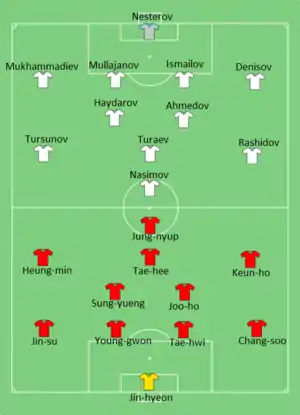 |
| ||||||||||||||||||||||||||||||||||||||||||||||||||||||||||||||||||||||||||||||||||||||||||||||||||||||||||||||||||||||||||||||||||||||||
|
Man of the Match:
Assistant referees:
|
China PR vs Australia
Tim Cahill's second-half brace sent Australia past China 2–0 and into the semi-finals. Cahill opened the scoring shortly after the break before doubling the lead midway through the second-half with arguably the goal of the tournament as Australia reached the last four for the second successive time. Ange Postecoglou's side would face either holders Japan or the United Arab Emirates in Newcastle for a place in the January 31 final in Sydney. Shortly after South Korea punched their semi-final ticket with a 2–0 extra-time win over Uzbekistan in Melbourne, China got off to the better start as Australia, looking slightly nervous, struggled to settle into the game between the Group B winners and the Group A runners-up at Brisbane Stadium.[8][9]
The Chinese strike-force of Sun Ke, with three goals from three games in the group stage, and Wu Lei caused problems for the Australian defence, calling goalkeeper Mat Ryan into action several times with their pace and ferocity. But the good times would not last for China, who could have put Australia under serious pressure had they scored within the first 30 minutes. Controlling more than 77 per cent of possession in the first half, Postecoglou's men eventually found their feet, going close a couple of times before the break that allowed them to regroup for the second half and in the 49th minute, Cahill did what he does best score in time of need for Australia.[10]
China cleared a corner from the right but Mathew Leckie headed right back into the box to keep the attack going. Cahill took advantage of a moment of freedom and hit an acrobatic overhead kick past goalkeeper Wang Dalei, who never saw it coming, reacting too late to the spectacular effort that put the hosts into the driver's seat. The deficit forced China to come out, giving Australia more space to work with, and it was Cahill again who capitalised five minutes past the hour, powerfully heading home a cross from left-back Jason Davidson to make it 2–0 and effectively put the game out of their opponents' reach.[11]
China PR
|
Australia
|
|
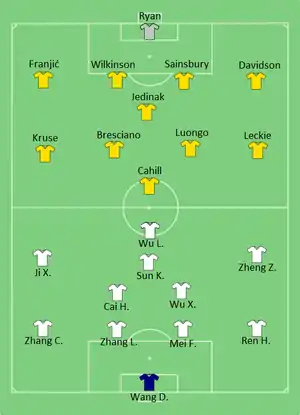 |
| ||||||||||||||||||||||||||||||||||||||||||||||||||||||||||||||||||||||||||||||||||||||||||||||||||||||||||||||||||||||||||||||||||||||
|
Man of the Match:
Assistant referees:
|
Iran vs Iraq
Salam Shaker scored the winner as Iraq claimed a place in the semi-finals after edging out arch-rivals Iran 7-6 on penalties following a sensational 3–3 draw at Canberra Stadium. Sardar Azmoun had put Iran in front midway through the first-half but his side went into the break a man down after Mehrdad Pooladi was controversially dismissed by referee Ben Williams.[13][14] Ahmed Yasin's 56th-minute equaliser then took the game to extra-time where Iraq twice went in front through Younis Mahmoud and Dhurgham Ismail but they were pegged back by Morteza Pouraliganji and most dramatically Reza Ghoochannejhad two minutes from the end.[15]
But after Iran substitute Vahid Amiri drilled his penalty onto the left-hand upright, Shaker held his nerve to claim victory for Iraq and take them into semi-final with South Korea at Stadium Australia in Sydney. The opening spells of the match were frenetic and furious but amounted to little before a typical driving run down the right from Ashkan Dejagah on 24 minutes was brought to a halt through a firm tackle from Ismail. Vouria Ghafouri, though, was on hand to pick up the pieces and whip in a venomous cross that Azmoun met with a thumping header into the bottom corner of the goal.[16]
Alireza Haghighi then saved well from Mahmoud with his feet but as the first period drew to a close there was time for a final moment of drama as Pooladi received his second yellow card of the match following a coming together with Iraq goalkeeper Jalal Hassan to see Iran go into the break a man down and within three minutes of the second half Iran almost saw their goal advantage disappear, too, as Yaser Kasim's free-kick was athletically saved by a Haghighi who launched himself to his left to tip the ball over the bar. But on 56 minutes Iraq got the equaliser they had been threatening as Alaa Abdul-Zahra's wicked cross from the left wing evaded defenders and attackers alike before Yasen latched onto the ball at the far post and drove his low angled shot through a group of players and into the net.[17]
Iraq continued to prod and probe at the 10-man side but were unable to take further advantage of their numerical superiority before the whistle was blown for the end of the 90 minutes and a period of extra-time. And the deadlock was blown open in just the second minute of extra time as cross from Ismail saw the ball clip off Haghighi's outstretched leg and pounced upon by Mahmood whose stopping header found the back of the net for his eighth goal in AFC Asian Cup competitions to put Iraq 2–1 up. A sensational spectacle was still not finished there, though, and with three minutes of the first half of extra-time remaining Pouraliganji thundered home Andranik Teymourian's corner with a bullet header to level the scores again.[18]
The defender went from hero to villain with five minutes remaining of the extra-time as his crunching tackle on Kasim saw a penalty awarded to Iraq. Ismail showed impressive composure to drive his spot-kick down the middle of the goal with Haghighi already committed to his right. But with two minutes remaining there was a further twist to the tail as once again from a Teymourian corner, Iran caused consternation in the Iraq defence as Javad Nekounam cannoned his header off the woodwork and Ghoochannejhad was on hand to head home to take the game to penalties.[19]
Ehsan Hajsafi blasted his opening spot kick over the crossbar for Iran, but Saad Abdul-Amir was unable to take advantage and hit his own effort wide and after Amiri hit the post in sudden death, Shaker kept his composure to beat Haghighi and claim victory for Iraq and a place in the semi-finals for the third time in the AFC Asian Cup history.[20]
After the match, the Iranian Football Federation lodged a formal complaint to FIFA after Iraqi midfielder Alaa Abdul-Zahra tested positive for the banned stimulant methylhexanamine, in results that were verified by a WADA-approved laboratory in Cologne.[21] In an email exchange dated September 2014, FIFA promised to take action but there is no record of a suspension for Abdul-Zahra.[21] The AFC disciplinary committee decided that the protest was unfounded and dismissed the case.[22]
| Iran | 3–3 (a.e.t.) | |
|---|---|---|
|
Report | |
| Penalties | ||
| 6–7 | ||
Iran
|
Iraq
|
|
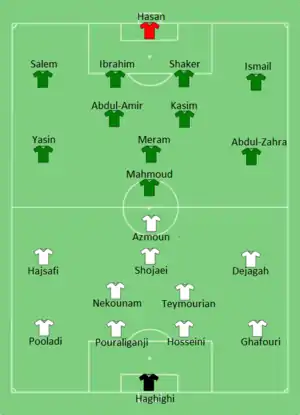 |
| |||||||||||||||||||||||||||||||||||||||||||||||||||||||||||||||||||||||||||||||||||||||||||||||||||||||||||||||||||||||||||||||||||||||||||||||||||
|
Man of the Match:
Assistant referees:
|
Japan vs United Arab Emirates
Defending champions Japan crashed out of the tournament on penalties as Shinji Kagawa missed the decisive spot-kick as the United Arab Emirates secured a 5–4 win after a 1–1 draw between the teams at Stadium Australia. Keisuke Honda was also off target from 12 yards while Ismail Ahmed scored the winning penalty to eliminate the champions as the UAE reached the semi-finals for the first time since 1996. Mahdi Ali's team would face tournament hosts Australia in Newcastle on January 27 as they aim to reach the final for the first time on foreign soil after losing to Saudi Arabia in the final in Abu Dhabi 19 years ago.[24]
Ali Mabkhout took his tally for the tournament to four from as many games with a well-taken effort in just the seventh minute but Gaku Shibasaki levelled nine minutes from time to take the game into extra-time after the Japanese finally secured a reward for their domination. Javier Aguirre named an unchanged side for the fourth game in a row while the United Arab Emirates were without the suspended Walid Abbas, who was ruled out after picking up a second yellow card of the tournament in the 1–0 loss against Iran in the group stages. The Emirates took the lead in the seventh minute, and soon after Mabkhout had given the Japanese a scare when the Al Jazira forward raced in only for a heavy touch to take the ball through to Eiji Kawashima. The 24-year-old, however, made no mistake with his second effort of the game as he controlled Amer Abdulrahman's ball forward before smashing a left-foot shot across Kawashima and into the far corner of the goal.[25]
Japan had already gone close in the opening two minutes when Takashi Inui headed just wide, while Honda's snap-shot in the ninth minute was only inches away from restoring parity. The defending champions continued to dominate possession and Inui again had the chance to find the back of the net, only for another weak header from Gōtoku Sakai's in-swinging cross from the right to drop into the goalkeeper's arms. Masato Morishige's header just after the half hour mark met with a similar fate and, just two minutes before the break, Honda powered his low left-foot effort into the side netting. Japan continued their search for the equaliser into the second half. Substitute Yoshinori Muto shot across the face of goal seven minutes after the restart and, two minutes later, the FC Tokyo striker headed wide after Yasuhito Endō's centre from the right.[26]
With Japan's front line faltering, Yuto Nagatomo tried his luck from the edge of the area, only to send his right foot shot over the bar while, on the hour mark, Kagawa's effort from the edge of the area, after a neat interchange with Honda was saved by Majed Naser. Khamis Esmaeel almost put the ball into his own net, only for Gōtoku Sakai to clear off the line and substitute Yohei Toyoda mistimed his header 15 minutes from time to steer the ball well wide. With nine minutes remaining, Japan finally equalised when Shibasaki picked up a return ball from Honda 20 yards from goal before smashing his right-foot effort low beyond Naser's outstretched right hand. Makoto Hasebe could have won it for Japan with five minutes remaining in normal time only for his shot to be blocked by Mohanad Salem's desperate lunge after Kagawa had earlier forced Naser to punch his attempt clear.[27]
Japan
|
United Arab Emirates
|
|
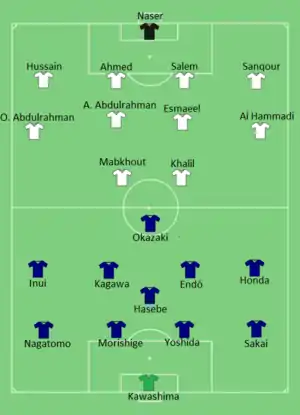 |
| |||||||||||||||||||||||||||||||||||||||||||||||||||||||||||||||||||||||||||||||||||||||||||||||||||||||||||||||||||||||||||||||||||||||
|
Man of the Match:
Assistant referees:
|
Semi-finals
South Korea vs Iraq
South Korea would play in the final of the AFC Asian Cup for the first time since 1988 after Uli Stielike's side handed 2007 champions Iraq a 2–0 defeat to book their place in the competition's final at Stadium Australia. The two-time champions, who have not won the continental title since 1960 would meet either hosts Australia or 21st Arabian Gulf Cup winners the United Arab Emirates on 30 January after goals from Lee Jung-hyup and Kim Young-gwon took the Taeguk Warriors past the Iraqis.[29]
South Korea last played in the final of the AFC Asian Cup in Qatar in 1988, when they lost on penalties to Saudi Arabia, and Stielike's side avenged a semi-final defeat at the hands of Iraq when Younis Mahmoud and his teammates went on to win in 2007. Stielike made two changes to his starting line-up, bringing in Han Kyo-won for former Asian Player of the Year Lee Keun-ho as veteran right back Cha Du-ri replaced Kim Chang-soo. Iraqi, meanwhile, called up Osama Rashid for the suspended Yaser Kasim and Amjad Kalaf took the place of Columbus Crew midfielder Justin Meram.[30]
The Koreans wasted little time taking the initiative, with Han Kyo-won narrowly missing with a diving header from Ki Sung-yueng's in-swinging free kick from the left while Nam Tae-hee tried his luck from distance, only to send the ball over the bar. Son Heung-min's 19th minute surge through the Iraqi midfield ended with the Bayer Leverkusen man seeing his drive from distance tipped over the bar by Jalal Hassan, and soon after Lee Jung-hyup claimed his second goal of the tournament.[31][32]
The 23-year-old Sangju Sangmu forward rose highest to reach Kim Jin-su's free kick from close to the right touchline before Hassan could punch clear, the header sending the Korean fans amongst the 36,053 crowd into raptures in the 20th minute. South Korea had been dominant in the first half but, with six minutes remaining in the half, Iraq finally had a sight of goal. Ahmed Yasin sent his long-range attempt well over the bar while, two minutes ahead of the break, Kalaf forced Kim Jin-hyeon to drop to his right to push a low shot away for a corner. Five minutes after the restart, however, the Koreans all but put the game to bed. Lee Jung-hyup was involved again, this time chesting the ball down on the edge of the area into the path of defender Kim Young-gwon and the Guangzhou Evergrande man's bouncing left footed shot skidded past Hassan and into the corner of the goal. Ki Sung-yueng and Son Heung-min both tried their luck unsuccessfully from long range soon after, before the increasingly desperate Iraqis started pumping the ball long towards captain Mahmoud. But the veteran could not find a way past a Korean defence that has yet to concede a goal at the tournament, and the Taeguk Warriors sealed their long-awaited place in the final of the continental championship.[33]
| South Korea | 2–0 | |
|---|---|---|
|
Report |
South Korea
|
Iraq
|
|
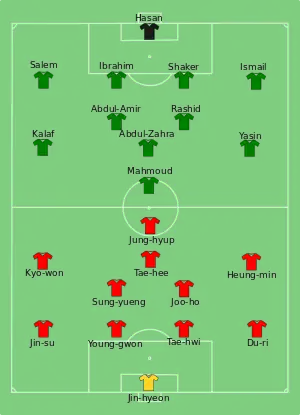 |
| ||||||||||||||||||||||||||||||||||||||||||||||||||||||||||||||||||||||||||||||||||||||||||||||||||||||||||||||||||||||||||||||||||||||
|
Man of the Match:
Assistant referees:
|
Australia vs United Arab Emirates
Hosts Australia advanced to face South Korea in the final game of the tournament after maiden international goals from both Trent Sainsbury and Jason Davidson in the first half at a damp Newcastle Stadium secured a 2–0 win over the United Arab Emirates. By setting up the final, this was the first time that Australia played the Final in their home soil.[35]
Sainsbury handed 2011 finalists Australia the ideal start to their bid to secure a second consecutive final appearance as the centre-back headed home inside the first three minutes of the semi-final with his first goal for the Socceroos and with Davidson following suit 11 minutes later as the full-back became Australia's 10th different scorer during the tournament, Ange Postecoglou's side would face two-time winners South Korea on 31 January at Stadium Australia looking to claim a maiden continental title. Both sides made two changes following their semi-final successes, with Australia recalling defender Matthew Spiranovic and midfielder Mark Milligan, while the UAE brought in full-back Walid Abbas and forward Mohamed Abdulrahman. And it was Spiranovic's central defensive partner Sainsbury who handed Australia the ideal start inside the first three minutes as the centre-back powered a downward header from Massimo Luongo's right wing corner past Majed Naser.[36]
Australia, though, were given a huge let off seven minutes later as Ahmed Khalil hit the foot of the post from Abdelaziz Sanqour's low cross with goalkeeper Mathew Ryan rooted to the spot but Australia took full advantage just four minutes later as the UAE defended desperately close to their own goal, but after only being able to scramble the ball out towards the edge of the penalty area, Davidson was on hand to fire a low first-time effort into the bottom corner past Naser. The UAE finally came into the contest at the end of the second half, but with Australia goalkeeper Ryan yet to be fully tested, the hosts still looked the more likely to add to their advantage.[37]
Omar Abdulrahman was finally having more of an impact on the contest at the start of the second half and the UAE remained in the hunt for way back into the contest as Khalil flashed an effort just wide six minutes after the restart with Ryan at full stretch. Australia coach Postecoglou reacted to this by reshaping the Socceroos' midfield just before the hour mark with the introduction of Matt McKay at the expense of Milligan and Australia were able to close out the contest without any major scares with Postecoglou having the luxury of being able to withdraw both Tim Cahill and Robbie Kruse as the UAE faded over the final minutes having fallen short of a return to the final for the first time since 1996.[38]
Australia
|
United Arab Emirates
|
|
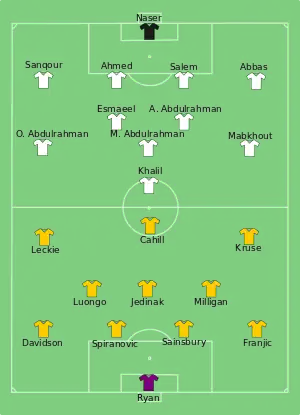 |
| ||||||||||||||||||||||||||||||||||||||||||||||||||||||||||||||||||||||||||||||||||||||||||||||||||||||||||||||||||||||||||||||||||||||
|
Man of the Match:
Assistant referees:
|
Third place match
Tournament leading scorer Ali Mabkhout netted a second half penalty as the United Arab Emirates claimed third place at the tournament after edging out former champions Iraq 3–2 in a thrilling contest at Newcastle Stadium. UAE captain Ahmed Khalil opened the scoring for the UAE after 16 minutes only for Waleed Salim and Amjad Kalaf to turn the contest in favour of 2007 champions Iraq before half-time but after Khalil levelled the entertaining contest at the start of the second half with his fourth of the campaign, Mabkhout coolly netted his fifth just before the hour mark after Iraq's Ahmed Ibrahim had been sent-off to hand the 1996 finalists their second-best finish at the AFC Asian Cup.[40]
With both coaches retaining the majority of their first team and only making minor changes to their starting line-ups following their semi-final defeats earlier in the week, it was the UAE's exciting front three which helped Mahdi Ali's side open the scoring as Mabkhout freed Omar Abdulrahman following a swift counterattack and Khalil was on hand to produce a first-time finish inside the penalty area from the perfectly weighted through ball. Iraq, though, were almost back on level terms just four minutes later as Younis Mahmoud's follow-up was acrobatically tipped over the crossbar by substitute UAE goalkeeper Khalid Eisa after Majed Hassan's attempted sliding clearance on the edge of the penalty area had bounced back off the woodwork following a deflection off the veteran striker.[41]
But Eisa was given no chance after 28 minutes as Salim was found inside the area by Kalaf and the full-back's strike crucially deflected off Khamis Esmaeel to beat the UAE goalkeeper high at his near post and Eisa was again beaten three minutes before half-time as the UAE custodian could only parry a low rasping drive from Ahmed Yasin from just outside the area and Kalaf was first to react to volley home from 10 yards. Iraq maintained their pressure at the start of the second half and came close to extending their advantage less than a minute after the restart as Mahmoud scuffed wide from inside the area with only Eisa to beat from Yaser Kasim's pass.[42]
The miss, though, proved costly for Iraq as just six minutes later Khalil beat the offside trap from Abdulrahman's superb chipped ball forward, and after taking one touch to evade onrushing goalkeeper Mohammed Hamed, the striker rolled the ball into the empty net. And three minutes before the hour mark the UAE completed the comeback as Ibrahim was sent-off after hauling down Mabkhout inside the area following a mistake by goalkeeper Hamed and the striker picked himself up to coolly beat the Iraq custodian from the resulting penalty to move one goal clear of Jordan's Hamza Al-Dardour and teammate Khalil at the top of the goalscoring chart.[43]
The UAE came close to extending their lead with 15 minutes remaining as substitute Walid Abbas headed against the foot of the back post from Abdulrahman's deep corner and despite Iraq pressing forward in the closing stages, the UAE held on to claim third place at the AFC Asian Cup for the first time having lost to China on penalties at the same stage in 1992.[44] The United Arab Emirates also effectively became the last team to claim the third place position in the tournament, when this stage was officially abolished in the eventual tournament held at the country.
Iraq
|
United Arab Emirates
|
|
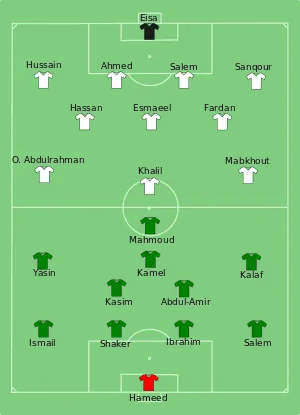 |
| |||||||||||||||||||||||||||||||||||||||||||||||||||||||||||||||||||||||||||||||||||||||||||||||||||||||||||||||||||||||||||||||||||||||||
|
Man of the Match:
Assistant referees:
|
Final
| South Korea | 1–2 (a.e.t.) | |
|---|---|---|
|
Report |
South Korea
|
Australia
|
|
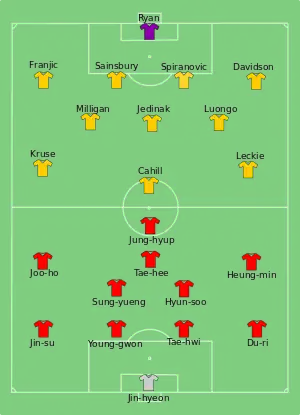 |
| |||||||||||||||||||||||||||||||||||||||||||||||||||||||||||||||||||||||||||||||||||||||||||||||||||||||||||||||||||||||||||||||||||||||
|
Man of the Match:
Assistant referees:
|
References
- "Match Schedule AFC Asian Cup Australia 2015" (PDF). AFC.
- "Wins, losses but no draws as Asian Cup hits record". FIFA.
- Asian Cup 2015: South Korea into semi-finals after beating Uzbekistan 2–0
- South Korea aims to continue dominance over central Asian rivals Uzbekistan
- South Korea 2-0 Uzbekistan (AET): Heung-Min Son double clinches semi-final berth
- South Korea book place in final four
- "Qosimov: Luck was against Uzbekistan". FourFourTwo. 22 January 2015. Archived from the original on 22 January 2015. Retrieved 22 January 2015.
- Tim Cahill double against China sends Australia into Asian Cup semi-finals
- Tim Cahill scores twice as Australia beat China 2–0 to book spot in Asian Cup semi-finals
- Asian Cup 2015: Australia beat China 2–0 thanks to two stunning Tim Cahill goals
- Socceroos' coach Ange Postecoglou has team on verge of history
- "Australia into Asian Cup semi-finals with 2–0 win over China". USA Today. Associated Press. 22 January 2015. Retrieved 22 January 2015.
- Former Socceroos blast referee Ben Williams for 'embarrasing' [sic] send-off in Iran's Asian Cup loss to Iraq
- Referee Ben Williams' 'embarrassing' decision
- Iraq shock Iran in thriller
- Joy for Mahmood as Iraq beat Iran in AFC Asian Cup quarterfinal
- Iraq beat Iran on penalties at Asian Cup
- Iraq boss defends ref, slams Iran after Asian Cup win
- Iraq beat Iran on penalties to settle classic Asian Cup encounter
- Iraq seek next Asian Cup upset
- Iran's protest over Iraqi player rejected
- "Asian Cup: Iran appeal against Iraq over ineligible player dismissed after quarter-final loss". abc.net.au. Retrieved 25 January 2015.
- "Iraq edges Iran on penalties, advances to Asian Cup semi-finals". The Japan Times. Reuters. 23 January 2015. Retrieved 24 January 2015.
- United Arab Emirates shock Japan to set up Asian Cup semi-final with Socceroos
- United Arab Emirates stun champions Japan on penalties
- UAE send stunned champions Japan tumbling out of Asian Cup on penalties
- Japan pay the penalty as UAE advance
- Khaled, Ali (23 January 2015). "Victory shows UAE coach Mahdi Ali as good as his word". The National. Retrieved 24 January 2015.
- South Korea reach Asian Cup final with victory over Iraq
- South Korea sinks Iraq to reach Asian Cup final
- South Korea 2–0 Iraq: Stieleke's men stroll into Asian Cup final
- Asian Cup semi-final: South Korea v Iraq – as it happened
- South Korea beat Iraq 2–0 to reach Asian Cup final
- Mulvenney, Nick (26 January 2015). "South Korea beat Iraq 2–0 to reach Asian Cup final". Reuters. Retrieved 26 January 2015.
- Australia see off United Arab Emirates to reach Asian Cup final
- Early goals carry Australia past UAE in Asian Cup semifinals
- "Early salvo sends Australia into Asian Cup final". Archived from the original on 2015-01-28. Retrieved 2015-01-28.
- Asian Cup: Australia backed as future World Cup host by AFC general secretary
- Larkin, Steve (27 January 2015). "Socceroo Luongo's star continues to rise". Yahoo! Sports Australia. Australian Associated Press. Archived from the original on 1 February 2015. Retrieved 27 January 2015.
- Cup 2015: United Arab Emirates defeats Iraq 3-2 to claim third place
- Asian Cup 2015: United Arab Emirates and Iraq meet in Newcastle for third place play-off
- Iraq 2-3 UAE: Khalil double seals third place
- Golden boot glitters as UAE size up Iraq
- Asian Cup 2015: United Arab Emirates and Iraq meet in Newcastle for third place play-off
- Hutchison, Peter (30 January 2015). "Dead-eye Mabkhout fires UAE to third at Asian Cup". Xinmsn. Agence France-Presse. Archived from the original on 31 January 2015. Retrieved 30 January 2015.
- Larkin, Steve (31 January 2015). "Australia down South Korea, win Asian Cup". Yahoo! Australia. Australian Associated Press. Archived from the original on 1 February 2015. Retrieved 31 January 2015.
External links
- AFC Asian Cup (Official website) (in English)
- AFC Asian Cup, the-AFC.com